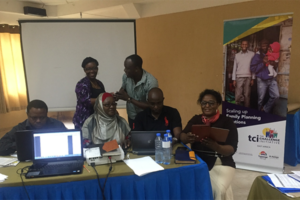Morogoro – Tanzania
 More than 50 health care providers gathered in Morogoro, Tanzania, this month to design family planning programs for Ilala, Kinondoni, Kigamboni Temeke and Ubungo in the Dar es Salaam municipal council. The Challenge Initiative was on hand to assist the Ministry of Health teams to identify and document family planning gaps and design programs to address the most critical ones. Tanzania is moving fast to ensure sensitization of health care workers on providing quality family planning services.
More than 50 health care providers gathered in Morogoro, Tanzania, this month to design family planning programs for Ilala, Kinondoni, Kigamboni Temeke and Ubungo in the Dar es Salaam municipal council. The Challenge Initiative was on hand to assist the Ministry of Health teams to identify and document family planning gaps and design programs to address the most critical ones. Tanzania is moving fast to ensure sensitization of health care workers on providing quality family planning services.
Branded Tupange Pamoja in East Africa, the Initiative aims to cost-effectively scale up innovations and best practices in family planning that were developed under the prior Tupange project using a demand-driven model for urban areas in the three countries: Kenya, Tanzania and Uganda. The three-year program is funded by the Bill and Melinda Gates Foundation and led by the Gates Institute at the Johns Hopkins School of Public Health.
“The gap analysis tool is significant because we can’t run our health units without knowing where we are heading to. We need to have a vision and focus, and it should be documented so that anyone coming to assist us will know the [priorities] and your strengths and weaknesses.” – Sister Clara Mwita, speaking on behalf of the Regional Health Coordinator, Dar es Salaam Municipal Council.
Along with taking a holistic approach using the Tupange interventions, the Morogoro workshop aimed at strengthening family planning programs within stipulated financial and technical resources.
“The beauty of the proposal development workshop supported through TCI Tupange Pamoja is that it has developed [our] skills so that we are able to develop concrete proposals to address a wide range of health gaps. Before this program, I had no idea the importance of prioritizing and identifying family planning gaps in line with available resources,” said Rehema Panga from the Ubungo Municipal council team.
The Initiative is built around the premise that putting cities in the driver’s seat of a program is essential to ensure success and also make sure that the impact lasts beyond the life of the program.
“As a result of this capacity building, we aim to see an improvement in quality of services and data management, following what we are learning and we will put in place,” noted Dr. Mwanahamisi Hassan, a member of the Ilala Municipal council team.
Reflecting on the week, Nusura Kessy, a nurse from Kinondoni municipal council, said, “We are rarely engaged in these kinds of platforms. This came as a surprise and we were happy we attended. What stood out for me was the interaction between different municipal teams, which enhanced our learnings.”


